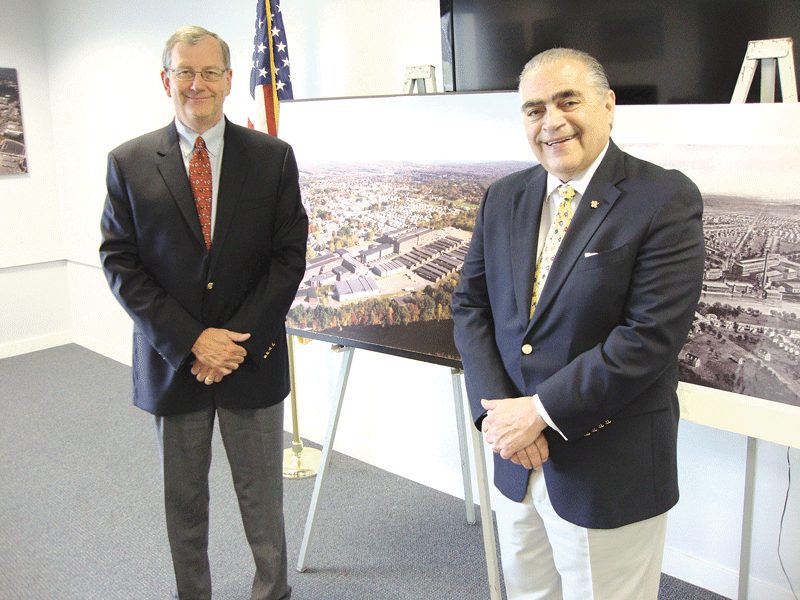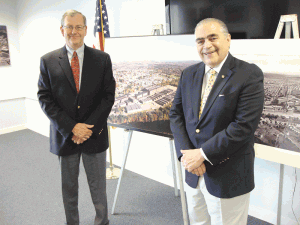
Doing Business In: Ludlow
A Mill Town Writes a New Chapter in Its History

Aaron Saunders says the Ludlow Mills site reflects one part of the town’s history, but farming has been another important aspect.
As he surveyed the landscape — old yet solid brick factory buildings bordered by broken expanses of asphalt with lanky grass growing in patches — Aaron Saunders said that this property is filled with the stories that gave birth to his town.
Walking around the Ludlow Mills, the chairman of the town’s Board of Selectmen remembered one particularly extreme tale — of the old smokestack, which he said was covered in diesel fuel and set afire to demolish it. “There are families living here that can trace their history there 100 years or more,” he said. “Those are the stories that maybe only one or two people still remember.”
Gesturing to the brick mills all around him, he added, “some of the older generations are still alive, and that means there’s a lot of living history here.”
He was at the property to tell BusinessWest about history in the making at this site bordered by State Street and the Chicopee River. The former Ludlow Manufacturing Associates jute mill has been selected as the latest property development undertaken by Westmass Area Development Corp. This past March, that organization secured funding to go forward with the remediation and redevelopment of this 170-acre site on the town’s southern border.

Bill Wagner, right, with Kenn Delude, says the Ludlow Mills project, if done right, could serve as a blueprint for other cities’ riverfront development projects.
Wagner said that, while Westmass has a history of successful site development, including the business and industrial parks at Westover, the project in Ludlow has some important and distinct qualities, some measured by the property itself, but also by the residents in town.
“When people in Ludlow first heard that we were involved in the property,” he said, “their first response was, ‘what can we do to help?’”
From the outset, the community has been invited to meetings intended to help determine the fate of this property, and both men agreed that Ludlow has been actively concerned with the property whose iconic clock tower graces everything from the town’s seal to its stationary to the high school’s class rings.
Doing business in Ludlow has long been reflective of many small towns in the area, with many primary services provided by locally owned operations. But as the mill property that gave the town much of its urban shape is redeveloped, an important aspect of this project stands a good chance to reinvent much of the way the Pioneer Valley looks at its riverfront industrial property.
It’s a big-picture perspective, but as Wagner pointed to a bucolic photograph of the greenway in front of the Ludlow Mills, he said, “the board’s opinion is that, if we revitalize this, and do it successfully, it will establish the blueprint for all the other communities to go forward with their riverfront property.”
Flower Power
Saunders was one of many people who spoke openly about their hopes for the future of the Ludlow Mills project. But he also mentioned the interesting nature of the town’s business profile. “Sure, this site is what built up all the houses in this part of town, but go just a couple miles east, and it’s all farmland.”
And while that agricultural legacy might have been eroded as the family farms were replaced by housing developments — another homegrown industry, you might say — Ludlow is still a place to get some of the finest local produce.
“Well, right now we’re in strawberry season,” Karen Randall said, “along with asparagus. This time of year is really the kick-off for the area’s growing season, and people have been busy putting in their perennial gardens, too.”
The second-generation owner of Randall’s Farm and Greenhouse on Center Street, she listed off all the local bounty that can be found in the market area of her operation. “Red and green leaf lettuces, summer squashes, tomatoes in late July, and then corn after the fourth of July. It’s really the exciting time of year for us. And if Mother Nature cooperates with sunny days, the ice-cream stand will be busy also.”
As she gets ready to celebrate the 50th birthday (next year) of the family business — what started out as a farmstand run by her mother and father — Randall said that her business has stayed in bloom throughout an otherwise down economy.
“The last two seasons have been good,” she explained, “and I’m really happy to say that. People do seem to be more relaxed. I haven’t quite figured out if people’s circumstances are better, or they’re just used to the way things are now, but people seem to be less nervous about the economy.”
While her business has a broad appeal far beyond the town limits, she said that efforts have been made to secure that market share. “We’ve developed our e-mail lists of customers, and our marketing through that. By touching our customers in that way, it has helped.”
But, as owner of one of the popular places for people to gather for coffee in the morning, she does see that there are other sectors that aren’t as rosy. “We do have a high concentration of construction companies in town who have taken a hit because there just isn’t a lot of new building out there,” she said.
That’s a sentiment that Bruce Libby said is unfortunate, but true.
He’s also a second-generation owner of a family business in Ludlow — Contemporary Structures Construction was started by him and his father back in 1975. They started as general homebuilders way back when, but in the early 1990s, during another downturn in the construction sector’s fortunes, a decision was made to hammer out some changes.
“We started doing staircases as a fill-in-the-gaps thing,” he explained. “Then it evolved into a great niche as the construction tide ebbed. So we focused on that, and today there are nine guys who work for me all year long — installers, shop people, estimators. Building finely crafted staircases is a nice area of focus.”
Today, that niche operation has ascended to a business that builds, on average, 200 to 300 staircases per year, from Worcester west to New York, up and down from Vermont to Connecticut.
In talking about the town’s construction economy, which saw a boom in houses built both in Ludlow and by its talented local builders in other communities, he tracked the changes from the perspective of his corner of the market.
“Five years ago, we probably did 95% new, and now it’s probably 50-50,” he explained. “There is still a market for new construction, but people are increasingly using remodeling as a means to get more out of their investment. New stairs, hardwood flooring, these are big improvements that add a lot of value to a home.”
He credits the Home Builders & Remodelers Assoc. of Western Mass as a key player in keeping the industry on a solid tread. “I’d say 80% of my contractor clients are from there,” he said of that trade group. And as tornado reconstruction gets underway, he’s looking to those colleagues to help rebuild the area. Ludlow, he said, will be well-represented in that effort.
“In general, Ludlow has a lot of contractor companies,” he added. “You won’t see a harder-working group of people.”
Rolling on the River
The development-update materials from Westmass refer to the Ludlow Mills project as “Our Next Challenge.”
While it is the largest brownfield mill-redevelopment project in New England, with nearly 1.5 million square feet of space in 66 buildings on 170 acres, the property is still in decent overall shape, both Delude and Wagner said. And, they agreed, the people of Ludlow have been vocal and helpful about what they hope to see both before and after the official sale — on track for early this month.
“The larger issue for the people of Ludlow,” Wagner explained, “was that they didn’t want it to deteriorate like other riverfront mill properties in the area, and become a potential big environmental hazard. They were very pleased that we were going to come in while the mill was still in a useful state.”
Delude said that Ludlow’s citizens have been engaged in meetings from the outset, to help determine what would be a good shape for the final results of the project. And, of course, his office’s track record speaks for itself.
“When people found out it was Westmass,” he said, “they knew that we’re looking for business uses, industrial uses, maybe in some cases a small residential component. This is contrasted with what they’ve seen in the past, when maybe there was a fear that there was too much of an emphasis on residential development.
“The focus here is on the creation of jobs still, with some mixed-use development,” he continued. “And that scope gives the plan its strength. If one sector is a little softer than others, you’ve got the others to support it.”
To elaborate on much-anticipated details is premature, Delude said, but he did note that two businesses have expressed strong interest in the property. “And both of them would be embraced by the community,” he added.
But one component to the Ludlow Mills which has both men, and indeed most everyone attached to the project, brimming with enthusiasm is the greenway along the property’s river edge. “There’s been a fence along State Street for almost 160 years,” Delude said, “prohibiting the people who live in these houses just across the street from getting to the river. In fact, by virtue of the infrastructure in town, there is no public access to this beautiful stretch of water.”
In response, Delude said that 50 acres of the project is to be set aside for a greenbelt and walkway along the river, stretching from the westernmost point, close to the town common, all the way along the property’s waterfront, up to a rail trestle spanning the bridge.
Putting that into perspective, Wagner said, “almost since we started talking about doing this, about five years ago, everyone is struck by the fact that, here in the Pioneer Valley, some of our most valuable land — the land along these clean and beautiful rivers — is banked with these old mills that are becoming more and more functionally obsolete. The real estate isn’t being put to its highest and best use.
“That has an economic cost to Western Mass. and to cities like Holyoke and Springfield and Chicopee,” he continued. “The fact that, thus far, you can’t use this shore property is a big negative. It’s a monumentally important effort that we’re putting forward here for not just Ludlow, but the future of our valley.”
It might sound like a lofty goal, but, then again, Delude and Wagner don’t limit the scope of what their office can accomplish. Looking at the images behind him of not just the Ludlow Mills complex, but of other Westmass projects, Delude said, “I think you can see why we chose this site in Ludlow; it does have the beauty, and it has the ability to create a model that Westmass could use going forward.”






